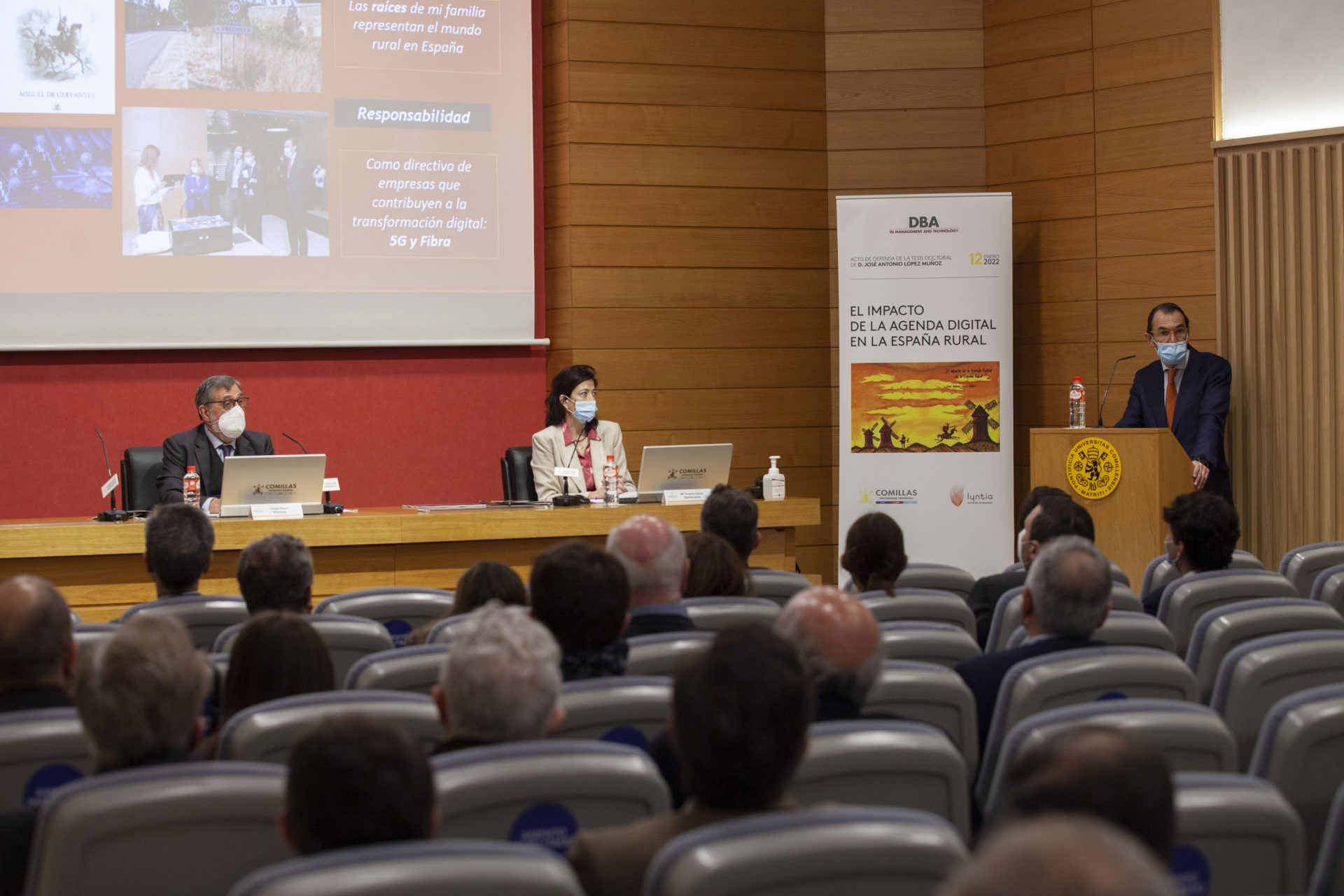
12 Jan Research findings of lyntia CEO, José Antonio López, in his DBA in Management and Technology thesis
- The pandemic brings the digital gap into focus and confirms Spain’s Digital Agenda targets are insufficient.

- Spain’s Digital Agenda translates into more fibre optic cable in rural Spain than in urban Europe. There is more fibre, for example, in Ávila, Cuenca, Orense, Zamora, and Gerona than in London, Milan, and Frankfurt. This favourable data conflicts with the reality of rural areas, however: the government of Spain recognises that there are between 800,000 and 1,400,000 residents with only 30 Mbps of connectivity and research shows another 200,000 without even that.
- As the CEO of lyntia points out in his doctoral thesis, “The impact of the Digital Agenda on rural Spain,” the challenge of covering the entire country with high-speed connectivity remains. Residents with 30 Mbps or lower (mainly in towns with fewer than 2,000 inhabitants) cannot partake in the digital immersion prompted by confinement and, as a result, their socioeconomic development is inferior, in contrast to those with 100 Mbps.
Madrid, 12 January 2022. The Covid crisis has revealed that the digital gap still exists in Spain, mainly affecting people living in rural areas, and thus contravening the goals established 10 years ago in the Digital Agenda. Not everyone enjoyed the same infrastructure during confinement and the guarantee of real digital connectivity in rural areas has been inconsistent and highly deficient in many localities.
This is one of the key findings of lyntia CEO, José Antonio López’s doctoral thesis for the DBA in Management and Technology of the Comillas Pontifical University, entitled “The impact of the Digital Agenda on rural Spain”. With more than 30 years of professional experience in the telecommunications sector, the lyntia CEO focused his research on determining whether the Digital Agenda has served to advance and adapt Spain to the digital world, and whether it has done so without geographic discrepancy and, therefore, equally for all residents, particularly those living in rural areas during confinement.
To that end, López analysed the effects of the European measures approved and implemented between 2014 and 2020 in Spanish towns with fewer than 2,000 residents. One of the main conclusions of the study found that connectivity at speeds of 30 Mbps is insufficient to cover the basic needs of users, with those smaller populations suffering disproportionately.
By contrast, populations with connectivity speeds of 100 Mbps managed to increase their average income by 1.4%, with Social Security membership rising 3.1% and unemployment falling 0.7%. In addition, the depopulation trend in rural Spain reversed, with an increase in population of 1.9%, relative to those with lower connectivity speeds.
The same results were not achieved among populations with 30 Mbps of connectivity: “100 Mbps changes the reality of these people. It succeeds in re-launching them economically, which was Europe’s intent, and often reverses depopulation trends. Therefore, it should be a priority to continue with Europe’s plan and ultimately reach all of them. From a socioeconomic point of view, the Digital Agenda’s target of providing universal coverage at 30 Mbps is insufficient. To achieve the goal of a social digital transformation and avoid digital gaps, 100 Mbps would be necessary for all residents.”
According to José Antonio López, “With 100 Mbps, video finally reached rural areas.” With connectivity speeds of 100 Mbps, an operator’s business value improves notably, especially in households that contract television and content services, as well as in terms of the number of total and fixed broadband customers. Consequently, considerable ARPU (average revenue per user) increases are attained.
Despite the fact that there is more fibre optic cable in rural Spain than in urban Europe—there is, for example, more fibre in Ávila, Cuenca, Orense, Zamora and Gerona than in London, Milan, and Frankfurt—the lyntia CEO asserts, “The challenge of covering the entire country with high-speed connectivity remains.”
Covid-19 lockdowns took this situation to the extreme in areas with lower connectivity speeds, which suffer from major deficiencies in basic digital needs. José Antonio López’s research confirms that confined people with connectivity of 100 Mbps successfully weathered the digital immersion resulting from the pandemic, while those with only 30 Mbps suffered from a disproportionate digital gap, unable to access the level of connectivity consistent with the rest of Spain, and having to increase their consumption of mobile data to offset the deficit. This situation of need and scarcity also generated an uptick in calls to file claims and report outages in an attempt to rectify the situation.
In his research, the lyntia CEO points out that Spain exceeds the European average and has improved its position notably since the Agenda’s approval, occupying one of the highest positions in terms of connectivity, with a score of 60.8, compared to the EU average of 50.1. This is due to the major deployment of fixed broadband with at least 100 Mbps, nearly doubling the European average household percentage.
Still, this favourable data conflicts with the reality of rural areas, where the situation is very different in terms of the availability of connectivity since a large portion of the country has not been included in the Digital Agenda’s universal coverage objectives. The government of Spain recognises that there are between 800,000 and 1,400,000 residents with only 30 Mbps of connectivity (Component 15: Digital connectivity, cybersecurity, and 5G deployment) and additional reports cited in the research state that there are still nearly 6,000 unique populations, with some 200,000 inhabitants, where connectivity fails to reach even 30 Mbps.
Public-Private Investment
Another important aspect that José Antonio López highlights in his research concerns public investment to achieve the Digital Agenda’s targets. López’s work finds that without the help of public funding, it would be impossible for private telecommunications operators to carry out the necessary investment. He notes that “In Spain, the percentage of private investment has been much higher than that recommended by the Spanish Commission on Markets and Competition, with the enormous effort this has entailed for companies,” and adds, “At lyntia, every day we help to connect ‘Empty Spain’ by providing the fibre needed to ensure ultra-fast connectivity reaches the thousands of people living in rural and semi-rural areas. I am confident that the results of this research will serve to restore equal opportunities to every inhabitant in this new digital world, regardless of place of residence. Spain is ready to lead a new wave of digitisation and, for the first time in its history, a transformation of this magnitude will take place nationwide. Spain is ready to transform itself by creating a sustainable model with social, economic, and ecological benefits.”
The DBA in Management and Technology thesis
The research presented by José Antonio López concludes his DBA in Management and Technology at Comillas. This research differs from that of a traditional doctorate—which bestow the qualification of academic doctor in Spain, or PhD elsewhere—because i) it relies on the vast professional experience of the candidates, ii) it is based on considerable access to relevant information, and iii) candidates pursue practical applications and economic and social effects. “José Antonio’s DBA thesis is a perfect manifestation of our goal when we launched the executive DBA programme three years ago: to provide senior executives with the training and methodology needed to put their knowledge and experience to work for society, to have the kind of impact that purely academic research sometimes fails to achieve,” says Javier Morales Mediano, co-director of the DBA in Management and Technology at Comillas ICADE. “We are enormously proud of José Antonio’s work, and hope he is the first of many to defend his research,” he concludes.
About lyntia
With a network that spans more than 43,000 km, lyntia, the benchmark neutral service provider in Spain’s wholesale telecom market, offers fibre optic connectivity services with extensive network coverage and excellent capillarity.
In addition, lyntia provides other types of connectivity services, including dark fibre, capacity, wholesale FTTH service, VSAT, internet and co-location.
lyntia’s fibre optic network connects the country’s major metropolitan centres and serves more than 3,200 towns. It also connects to the Peninsula’s main underwater cable mooring points.
lyntia is one of the companies in the portfolio of Antin Infrastructure Partners, a leading infrastructure fund based in Paris, London, and New York. Antin focuses on the acquisition of majority interests in infrastructure businesses in the telecom, energy, environmental, transport, and social infrastructure sectors.
About the DBA programme of the Comillas Pontifical University
The Department of Economics and Business Studies (Comillas ICADE) and the Advance Technical School of Engineering (Comillas ICAI) present the first public doctoral thesis defence in Business Administration – Management and Technology. Comillas’ DBA programme is aimed at senior professionals with extensive experience and specific expertise, who wish to update their training in technology as a driver of transformation, in management in the new digital world, and in the humanities, and who, with that experience and training, aim to contribute to academia and business in particular and society in general by researching, publishing, and defending a DBA thesis.
For more information
QMS Comunicación
913431286/87

